Related Research Articles

Raymond Hart Massey was a Canadian actor, known for his commanding, stage-trained voice. For his lead role in Abe Lincoln in Illinois (1940), Massey was nominated for the Academy Award for Best Actor. Among his most well known roles were Dr Gillespie in the NBC television series Dr. Kildare (1961–1966), Abraham Farlan in A Matter of Life and Death and Jonathan Brewster in Arsenic and Old Lace (1944).

Dame Gladys Constance Cooper, was an English actress, theatrical manager and producer, whose career spanned seven decades on stage, in films and on television.
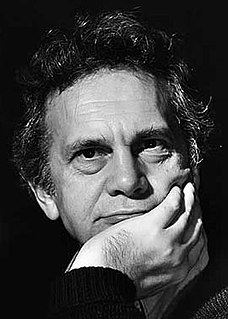
Daniel Raymond Massey was an English actor and performer. He is possibly best known for his starring role in the British TV drama The Roads to Freedom, as Daniel, alongside Michael Bryant. He is also known for his role in the 1968 American film Star!, as Noël Coward, for which he won a Golden Globe Award and an Oscar nomination.

Private Lives is a 1930 comedy of manners in three acts by Noël Coward. It concerns a divorced couple who, while honeymooning with their new spouses, discover that they are staying in adjacent rooms at the same hotel. Despite a perpetually stormy relationship, they realise that they still have feelings for each other. Its second act love scene was nearly censored in Britain as too risqué. Coward wrote one of his most popular songs, "Some Day I'll Find You", for the play.

Raymond Stanley Noble was an English jazz and big band musician, who was a bandleader, composer and arranger, as well as a radio host, television and film comedian and actor; he also performed in the United States.

Joan Ann Hackett was an American actress of film, stage, and television. She starred in the 1967 western Will Penny. She was nominated for the Academy Award for Best Supporting Actress and won the Golden Globe Award for Best Supporting Actress for the 1981 film Only When I Laugh. She also starred as Christine Mannon in the 1978 PBS miniseries version of Mourning Becomes Electra.
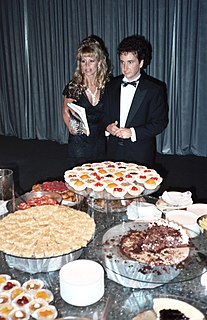
Mark Linn-Baker is an American actor and director who played Benjy Stone in the film My Favorite Year and Larry Appleton in the television sitcom Perfect Strangers.

Alice Margaret Ghostley was a Tony Award winning American actress and singer on stage, film and television. She was best known for her roles as bumbling witch Esmeralda on Bewitched, as Cousin Alice (1970–71) on Mayberry R.F.D., and as Bernice Clifton (1986–93) on Designing Women, for which she received an Emmy nomination for Best Supporting Actress in a Comedy Series in 1992. She was a regular on Nichols (1971–72) and The Julie Andrews Hour (1972–73).

The Tony Award for Best Performance by a Leading Actress in a Play is an honor presented at the Tony Awards, a ceremony established in 1947 as the Antoinette Perry Awards for Excellence in Theatre. The award is given to actresses for quality leading roles in a Broadway play. Despite the award first being presented in 1947, there were no nominees announced until 1956. There have been two ties in this category, and one three-way tie.
Oscar Wilde is a 1936 play written by Leslie and Sewell Stokes. It is based on the life of the Irish playwright Oscar Wilde in which Wilde's friend, the controversial author and journalist Frank Harris, appears as a character. The play, which contains much of Wilde's actual writings, starts with Wilde's literary success and his friendship with Lord Alfred Douglas, turns into a courtroom melodrama, and ends with Wilde as a broken alcoholic after two years in prison.

Philip Merivale was an English film and stage actor and screenwriter.

The Letter is a 1927 play by W. Somerset Maugham, dramatised from a short story that first appeared in his 1926 collection The Casuarina Tree. The story was inspired by the real-life Ethel Proudlock case which involved the wife of the headmaster of Victoria Institution in Kuala Lumpur who was convicted in a murder trial after shooting dead a male friend in April 1911. She was eventually pardoned.

The Shining Hour is a 1938 American romantic drama film directed by Frank Borzage, based on the 1934 play The Shining Hour by Keith Winter, and starring Joan Crawford and Margaret Sullavan. The supporting cast of the MGM film features Robert Young, Melvyn Douglas, Fay Bainter and Hattie McDaniel.

Adrianne Allen was an English stage actress.

George Melville Cooper was an English actor. His many notable screen roles include the High Sheriff of Nottingham in The Adventures of Robin Hood (1938), Mr. Collins in Pride and Prejudice (1940) and the wedding-rehearsal supervisor Mr. Tringle in Father of the Bride (1950).
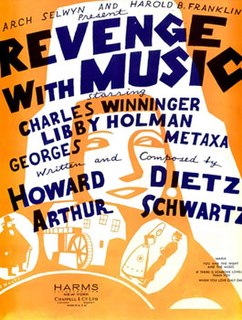
Revenge with Music is a musical comedy with book and lyrics by Howard Dietz and music by Arthur Schwartz, that opened on Broadway in 1934. This was the first "book" musical by Dietz and Schwartz.
Hitchy-Koo of 1919 is a musical revue with music and lyrics by Cole Porter and a book by George V. Hobart. This revue was third in a series of four Hitchy-Koo Broadway revues from 1917 to 1920 produced by, and starring, Raymond Hitchcock. The revues were named after the 1912 popular song "Hitchy-Koo" by composers Lewis F. Muir and Maurice Abrahams with lyrics by L. Wolfe Gilbert; the only song which was featured in all of the Hitchy-Koo revues. The original Broadway production of this version played in 1919. The revue received favourable reviews.
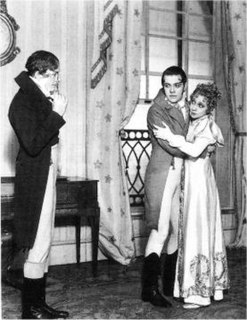
Gladys Edith Mabel Calthrop was an artist and leading British stage designer. She is best known as the set and costume designer for many of Noël Coward's plays and musicals.

Someone Waiting is a 1953 thriller play by the British writer Emlyn Williams.
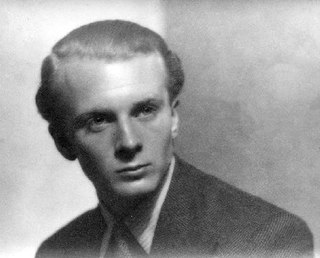
John Rodney Buckmaster was an English actor on the stage, in films and on television, and a cabaret singer-songwriter. He was the son of actress Gladys Cooper (1888–1971) and Captain Herbert Buckmaster (1881–1966). Educated at Eton College, he followed his mother into the acting profession and worked on both sides of the Atlantic.